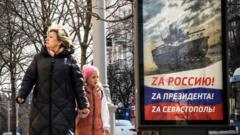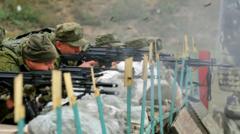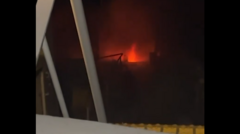Amidst ongoing conflict and occupation, women from Ukrainian territories share their harrowing experiences of repression, cultural erasure, and acts of underground resistance against the Kremlin's brutal regime.
Women Under Siege: Ukrainian Voices from Occupied Territories

Women Under Siege: Ukrainian Voices from Occupied Territories
Residents in Russian-occupied Ukraine reveal the dire reality of living under oppressive rule, facing threats to their identity and culture.
"Russians are trying to ban everything Ukrainian here: language, and also traditions. Even Ukrainian holidays are forbidden." This poignant statement echoes the fears and sorrow of those living in the Russian-occupied territories of Ukraine. One unnamed woman, referred to as Maria, encapsulates the struggle endured by many in her local area, where the Kremlin's harsh restrictions aim to eliminate Ukrainian identity.
As the United States takes on a diplomatic role in the peace negotiations for Ukraine, the realities on the ground tell a different story. Occupied residents are bracing for a future marked by repression and fear. The Russian government has implemented stringent measures meant to quash any semblance of disagreement or cultural autonomy, as claims mount that Kyiv may eventually have to cede certain territories to Russia as part of a peace agreement.
Speaking out can prove deadly. Maria is part of an underground group of women focusing on peaceful resistance, primarily through the distribution of leaflets. "You have fear in your eyes, but your hands are still doing it. Of course it's scary," she reveals during an interview with the BBC while remaining anonymous for her safety.
The climate of distrust is so severe that residents of Mariupol, a city devastated by Russian invasion, are hesitant to engage with outsiders. One message relayed the fear of exposing truths that could lead to deadly repercussions. Former resident Sofia, who now lives in the UK, shared the anxiety of communicating with her parents still trapped under occupation. An incident where her parents were searched by the FSB only heightened her fears about their security.
Others, like Yeva, remain deeply concerned for relatives living in occupied zones, describing how pro-Russian propaganda has tainted communications with loved ones. Instances of retaliation against residents who speak out or engage with individuals assisting Ukrainian forces are rife, as friends recount stories of acquaintances subjected to severe punishment for their actions.
Maria describes a pervasive surveillance system being established in occupied cities, where CCTV cameras aim to monitor dissenters. The chilling realities are compounded by the losses endured, with human rights groups reporting the deaths and disappearances of Ukrainian activists—121 of whom were reportedly killed during the initial stages of the invasion.
Despite the overwhelming dangers, a network of underground resistance groups, including an all-female movement named Zla Mavka, strive to ensure Ukrainian identity persists amidst Russian dominance. These groups, while operating in extreme secrecy and under constant threat, continue to spread symbols of national pride through leaflets and community actions.
Systematic erasure of Ukrainian identity is rampant; Maria noted how city centers sport Russian propaganda and imagery glorifying state leaders. The Kremlin has implemented bans on Ukrainian media, while local youths are increasingly drawn into pro-Russian narratives through state-controlled education systems.
As the war carries on, the plight of those living under Russian occupation remains precariously uncertain, juxtaposed against their unyielding spirit to resist and protect their heritage.


















